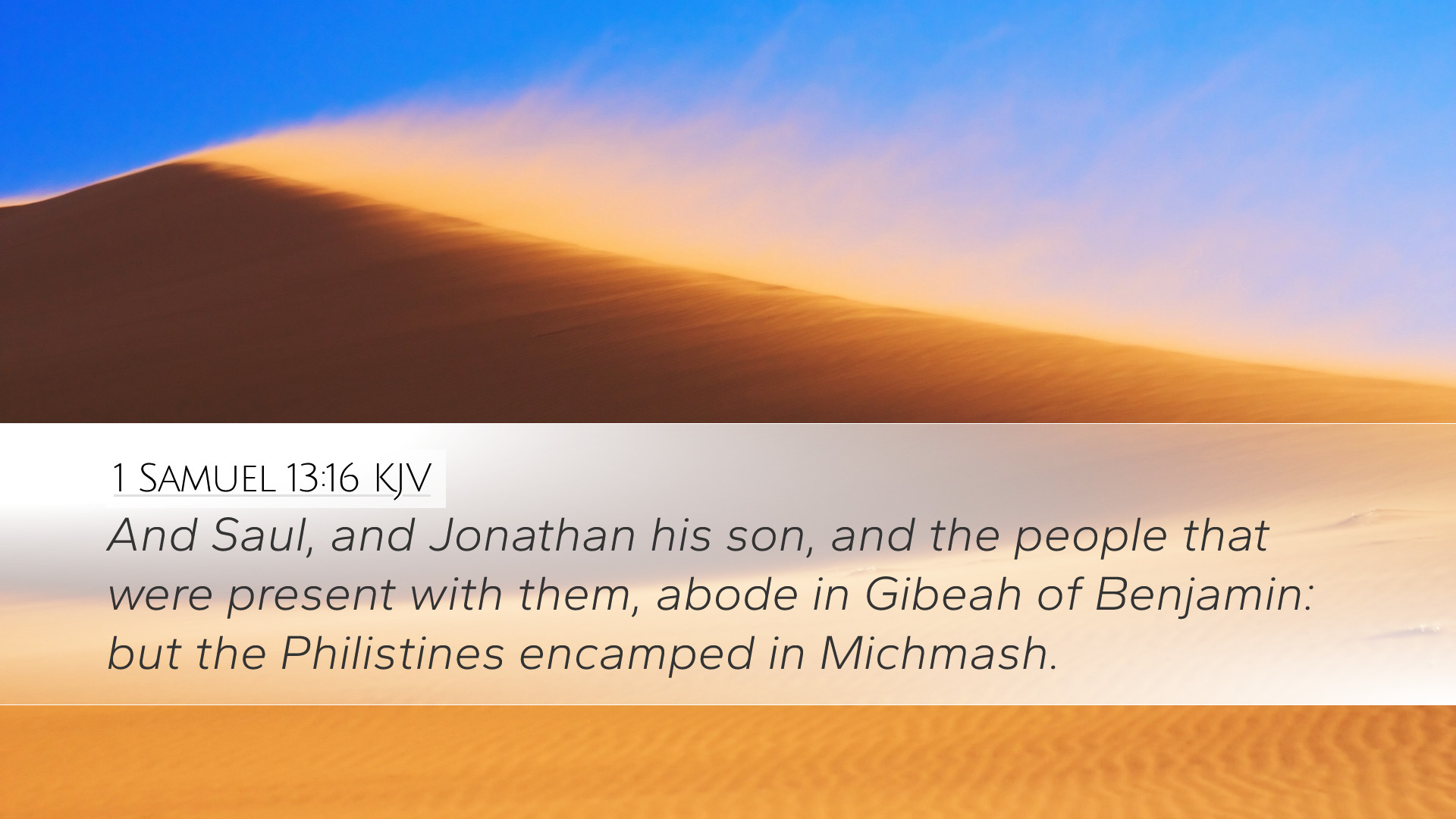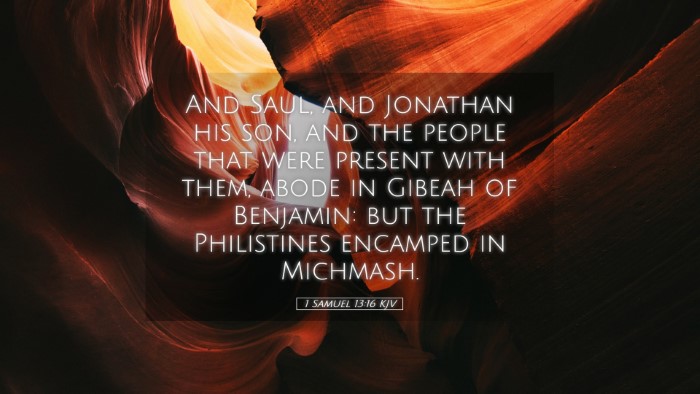Commentary on 1 Samuel 13:16
In 1 Samuel 13:16, we read: "And Saul, and Jonathan his son, and the people that were present with them, abode in Gibeah of Benjamin: but the Philistines encamped in Michmash." This verse serves as a pivotal moment in the narrative of Saul's reign, and it is essential to explore its significance through the lens of various public domain commentaries.
Contextual Background
To understand the weight of this verse, one must situate it within the broader context of Israel's history. During this period, the Israelites were in a constant struggle against the Philistines, who represented significant threats to their existence and sovereignty. This battle was not just a military conflict; it was a confrontation between the covenant people of God and their enemies, encapsulating questions of faith, leadership, and divine support.
Insights from Commentaries
Matthew Henry's Commentary
Matthew Henry emphasizes the significance of the characters involved in this verse. He points out that Saul, as the first king of Israel, was entrusted with the leadership of the nation during perilous times. His presence in Gibeah symbolizes a place of relative safety, yet it also reveals a lack of proactive engagement with the pressing threat posed by the Philistines.
Henry notes the contrast between Saul and his son Jonathan. While Saul's actions may reflect a hesitancy rooted in fear, Jonathan's narrative arc signifies valor and faith. This contrast is highlighted by the fact that Jonathan is often seen as a figure willing to act against the Philistine oppression, further emphasizing the tension within Saul's leadership.
Albert Barnes' Commentary
Albert Barnes expounds on the strategic significance of Gibeah and Michmash. He explains that Gibeah was situated in a position of relative safety and was identified with Saul’s tribe, Benjamin. However, the Philistines' encampment at Michmash just a short distance away pointed to the aggressive nature of their presence. Barnes notes that this proximity reflects the ongoing threat to Israel’s security and underscores the inadequacies of Saul's response to the Philistine challenge.
Barnes suggests that the complacency of Saul and his men could lead the Israelites to spiritual and military peril. Rather than maneuvering confidently against their foes, they remained static, ultimately risking their stability as a nation. This commentary serves as a warning against spiritual lethargy and emphasizes the necessity of active faith in facing adversities.
Adam Clarke's Commentary
Adam Clarke offers a critical view on the implications of Saul's leadership choices. He remarks on the disarray in the Israelite camp relative to the disciplined Philistine forces. Clarke further notes the symbolism of the locations: Gibeah represents the shelter of the tribe of Benjamin, yet it is also a place indicating Saul's reluctance to confront the menace.
Additionally, Clarke highlights the communal aspect of this verse. The mention of "the people that were present with them" reflects the collective nature of the Israelites' plight. Yet merely coexisting in Gibeah without action against the Philistines reveals deeper issues related to community faith and unity in facing external challenges.
Theological Reflections
Through examining this verse with insights from respected commentators, we observe that the themes of leadership, community, and divine trust weave deeply into the narrative. The implications for modern readers—pastors, theology students, and scholars—are profound.
- Leadership and Responsibility: Saul's hesitancy to act serves as a reminder for leaders today about the importance of decisive action grounded in faith.
- Community and Unity: The presence of the people alongside Saul echoes the necessity for communal effort in the face of trials, emphasizing the importance of collaboration in faith communities.
- Faith in Adversity: The proximity of the Philistine camp serves as a metaphor for the challenges that confront believers. It reminds us that faith must be coupled with action, especially when faced with adversity.
Conclusion
1 Samuel 13:16 encapsulates a critical moment of decision and reflects broader themes relevant to faith and practice. The insights from Matthew Henry, Albert Barnes, and Adam Clarke provide a multidimensional approach to understanding this passage, encouraging modern readers—whether pastors, students, or scholars—to internalize and apply these lessons in their lives and ministries.


